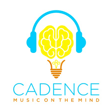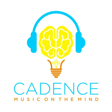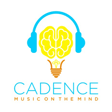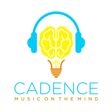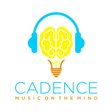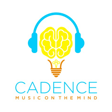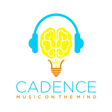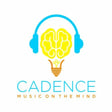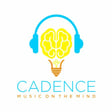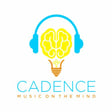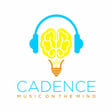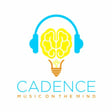Become a Creator today!Start creating today - Share your story with the world!
Start for free
00:00:00
00:00:01

S03 Episode 04: Music During the Holidays
Transcript
Introduction to Music and Mind
00:00:01
Speaker
Welcome back to Cadence, the podcast where we explore what music can tell us about the mind.
Music in Holiday Traditions
00:00:15
Speaker
This episode is about music during the holidays. We are entering an unprecedented holiday season, but one that perhaps is more necessary than it ever has been in the past.
00:00:27
Speaker
Since music is an important part of many rituals and traditions, it's no less important when it comes to the holidays around the winter solstice, whether you're celebrating Hanukkah, or Kwanzaa, or Christmas, or New Year's, or any one of these holidays that enter at a time when a lot of the world is in darkness.
Emotions and Memory: Dr. Moore's Insights
00:00:47
Speaker
Music provides a kind of light and joy and sense of togetherness. When we take a pause to consider the past year, look forward to the next year, get together with the people that we love, and maybe take a little break from our work. It's a time for us to process our emotions, and it can also generate a lot of feelings. Here's Dr. Kimberly Senna Moore, who's a licensed music therapist.
00:01:09
Speaker
The connection between music and our emotions has been recognized for centuries, and it's really only been in the past couple of decades that researchers have really begun to look at and explore how and why this is happening. For example,
00:01:26
Speaker
Music can simply just portray certain emotions. Just as a simplistic example, the tonality of a major key tends to be associated with happiness, whereas the tonality of a minor key tends to be associated with sadness.
00:01:41
Speaker
This first theory was actually first outlined by Meyer in the 1950s. But Meyer's theory of expectations proposes or states that we develop assumptions based on just listening to music in our particular cultural context. So we have, you know, this idea of expectations. Music can also tap in to our memories in a really a quite profound way. Emotions serve as a way to tag our memories
00:02:11
Speaker
And it doesn't really matter what that emotion is. It can be a positively valenced emotion or a negatively valenced emotion. Just the fact that there is an emotion connected to it kind of deepens the memory.
Choral Singing and Emotional Synchronization
00:02:24
Speaker
And music is able to tap in to, in particular, those emotional memories, where we will hear a piece of music and we can immediately go back to a person or a place or a time and feel those emotions
00:02:41
Speaker
that that person, place or time is associated with. Music is often what brings people together, especially romantic couples. The holidays, a time when we hope to see our loved ones and spend time with them, can also remind us of those we've lost.
00:02:58
Speaker
I remember when I was in my first graduate work working on my master's, one of my neighbors, you know, when he found out that I was a music therapist and a music, you know, a graduate music therapy student, started to talk to me about his wife and how he and his wife who had passed away like a year before I met him.
00:03:18
Speaker
how they would always listen to jazz together, and they would go to jazz clubs, and that was a thing that they shared listening to jazz. And since her death, he has not been able to listen to jazz. So imagine a similar concept with holiday music. Holidays happen every year, and we tend to do some of the same rituals and routines year after year after year.
00:03:44
Speaker
In a lot of traditions around these particular holidays in December and January, choral singing is a big part of people's rituals.
Synchronization and Health: Dan Pink's Research
00:03:53
Speaker
Caroling, for example, has been a long tradition in places where Christmas is celebrated. And choral singing in particular is really good at bringing us together. It can help us become more in sync with each other and also get on the same page when it comes to the emotions we're feeling. Here's Dan Pink, bestselling author of books about business, work, and creativity.
00:04:13
Speaker
Well, there's some very interesting research in how people synchronize with other people in time. So it's everything from certain kinds of delivery services to rowing teams to singers and choruses. And what the research shows is that there's a certain set of rules that seem to underlie effective coordination and synchronization of teams. But to me, one of the most interesting things is that
00:04:42
Speaker
coordinating synchronizing with other people changes us in some really interesting ways. It improves our health, physical and mental. It makes us more likely to do a good deed. So obviously there's a power of music on many, many, many dimensions. But there's a difference in this research between singing
00:05:00
Speaker
and singing in a group. Singing in a choir is basically as good for you as things like meditation and exercise. Here are among the things that it does. First of all, it's a mood booster, no question about that. It can be, there's some research showing that it can be a prophylactic against depression. But here's where it gets interesting.
00:05:20
Speaker
It synchronizes with other people, singing in a choir raises people's pain threshold. So you stub your toe before singing in a choir and stub your toe right after singing in a choir, it'll hurt less in general. And the other thing that's pretty amazing is that, again, when we talk about mood, it's self-reported. So it's like, you know, we have people rate what their mood is, how they're feeling and whatnot. But there's some interesting research showing that, let's say I were to take your
00:05:49
Speaker
a blood draw from you and measure your immunoglobulin levels, measuring your immune response. And then you go and you sing in a choir. When I take your blood draw after singing in a choir, in general, people's immunoglobulin levels have
00:06:08
Speaker
increase.
Cooperation Through Music
00:06:09
Speaker
That is, their immune response is heightened from the experience of singing in a choir, which is pretty remarkable. There are changes at the physiological level because of choral singing. There's some fascinating research on kids showing that when kids play synchronized games, when they do synchronized coordinated activities,
00:06:32
Speaker
Even things, even rudimentary musical things like games of clap and tap where the teacher claps out a rhythm and the students have to repeat it in unison. That kids who play those kinds of games are more likely to cooperate with other kids, more likely to cooperate with the teacher, more likely to express the desire to play with kids who don't look like them. That one of the effects of synchronization is that
00:07:02
Speaker
we actually become better people.
The Pervasiveness of Christmas Music
00:07:08
Speaker
But in Western countries in particular, Christmas music is something that is hard to get away from during the holidays. In fact, some stores start piping music in October that is supposed to harken the time for Christmas buying. It seems to get earlier every year. This year might be different because a lot of people are not doing their shopping in person.
00:07:29
Speaker
But remember last year or the years before when all of a sudden it seemed like you just couldn't get away from Christmas music? Elizabeth Hunter from the Quiet Ann Arbor Project is a lifetime musician who wishes restaurants and stores would stop piping in music.
00:07:45
Speaker
piped music is a secondhand smoke of our lives and the wallpaper around us at all times, pretty much everywhere we go now. It was probably about 15 years ago that I decided I didn't like to be forced to listen to music in stores. Before that, I think I was oblivious to it. I do think that as people age, they lose
00:08:10
Speaker
Or they become more sensitive to sound. So I think that's true, and I've read that. So that's part of it. And maybe my own career, because it's pretty much my life. I just started playing piano when I was young.
00:08:27
Speaker
And I sang in choirs throughout my growing up years and studying piano. I was also a jazz singer and I just did music sort of 24-7 for my entire life. But I have also, and this is why it gets confusing, I've spoken to non-musicians who are as bothered by it as I am. And I've also spoken to young people. You know, people of all ages who don't like it.
00:08:54
Speaker
You might find it odd that a lifetime musician would not want to hear music. But the point is, is that a lot of music is forced upon us and a lot of us might feel the same way. What's more, piped in music doesn't affect all of us in the same manner. For some of us, it can be downright difficult to hear a conversation when music is being played in the background. I know there are some other health issues like people with autism
00:09:20
Speaker
have a terrible time in loud restaurants and shops. People who have disabilities such as blindness and deafness have a terrible time.
Campaign Against Piped Music: Pipe Down
00:09:31
Speaker
So yeah, there are a whole list of us. It's very insensitive to a large group of people. I just think there's something that's, it's much harder to quantify. When a person is in a wheelchair, that's just very, a concrete, easy to understand issue. And I think the auditory problems in our society right now, it just needs to be studied more and understood more.
00:09:57
Speaker
So what do you do when you go to a restaurant and the music is irritating? My first question is always if they'll turn it off. And that's 99% no. And then maybe about, I'd say, 75% of the time they say, oh, I can turn it down. And usually that means by not much.
00:10:19
Speaker
If music is so annoying to such a large proportion of people, why do almost all restaurants use it? Two things I think I've heard. One is it helps people converse with each other. They feel more private when music is playing. And two,
00:10:34
Speaker
It helps patrons not have to hear, you know, the back room or the noise at the bar or whatever, the chef. A few years ago, she found out about Pipe Down. The Pipe Down campaign is a UK-based environmental campaign that started in 1992. They make the point that some people find pipe in music the most irritating thing in their modern lives. And the vast majority of people with hearing problems hate it.
00:11:01
Speaker
The way I found out about pipe down was eating in a restaurant talking with my friend about this problem because we were hearing it in the restaurant and the people at the table next to us overheard and we got into a conversation with them and that man told me about pipe down.
00:11:22
Speaker
So word is spreading. So after she found out about this UK-based group, she decided to take matters into her own hands in the US. Well, my next step after hearing about it was to make flyers and post them around town and other places that I would travel to.
00:11:38
Speaker
just post them wherever I could. Well, mainly it was just to make people aware of pipe down so that they'd have a place that they could go and read about these issues and see that there was something happening. So it was really just to educate and just get that website out into the public. So that was my first thing that I did.
00:11:59
Speaker
And then, I guess, the most important thing that happened was that Gina Che put an email on nextdoor.com, and this was, I'm thinking, two years ago now. But her post was, does anyone know of a quiet place to study in Ann Arbor? And I thought, okay, here's the kindred spirit. So I contacted her and we had a meeting.
00:12:24
Speaker
and she had just graduated from University of Michigan in neuroscience and psychology.
00:12:31
Speaker
So she went ahead and made the website, which is quietanarbor.org. And so together, we've slowly been plodding along and trying to get the word out. So what can you do if you find a particular restaurant or store or other place to be piping in music or sounds that you find really aversive? Well, you can record it using an app called Soundprint.
00:12:57
Speaker
Soundprint was started by a New Yorker and it's basically a website and an app and people can use that on their phones and they can take sound recordings in stores and restaurants and cafes and wherever they want and it will automatically go to this website and it will be registered on maps and when people find out about this and they want to know
00:13:22
Speaker
If they're anywhere in the United States, where is a quiet restaurant? They can go to this website and they can find out.
Music in Advertising
00:13:34
Speaker
So even though a lot of people say that they don't like pipe music or find it irritating and that it can disproportionately harm people with disabilities, music still remains a way in which companies can influence people to buy things that they want them to buy or to just generally establish better feelings towards a brand. Advertising without music is pretty ineffective. I'm Jay Benia. I'm one of the founders of The Elements Music and we are essentially a music agency and we work with
00:14:05
Speaker
Generally, some of the biggest brands in the world to either create original music for them or to find music for them for their ads. But that's got to be tough, right? Because even the Happy Birthday song is really expensive to license. So if you want a song like All I Want for Christmas is You to use in an ad, how does the company go about doing that?
00:14:27
Speaker
I mean, the first thing you would have to do if you were an addict this year, an advertiser wanting to do that is you'd have to look into licensing the publishing side of that. So for something like, Oh, I want for Christmas, that might not be public domain. So some of these old holiday classic songs are our public domain. In that sense, you can just kind of do whatever you want to do with them.
00:14:48
Speaker
But if they're not, then you got to make sure that you can go ahead and pony up what it's going to cost you to license the publishing side of that so that you can actually put it in our hands, essentially. At that point, you'd call us up and we'd have a conversation about what we're looking for in general and what your visual is going to be and the emotion that you're wanting to evoke. Are we harkening to the classic version of it and sort of doing a remake that's based on that?
00:15:15
Speaker
Or are we doing something completely different that's more of a remix or just a complete remake or a complete reimagining of the whole thing? But we all know, if we've ever watched parts of our favorite movies with the sound turned off, that music has a huge influence on how we feel and how that surge of emotions ebbs and flows. And since a lot of our behavior is driven by how we feel, music is a natural tool that companies can use to nudge people's behavior.
00:15:43
Speaker
So what goes into the thought process when a company is trying to choose the music that they want to associate with? I would say in terms of the science of music and sound.
00:15:54
Speaker
and the effect of that on people. I think we all sort of know it instinctually, but it's honestly still not hugely on the radar of a lot of people at the ad agency level. We're learning a lot more about that as we evolve as a company and doing a lot more explaining and pulling science and data into a lot more discussions around that.
00:16:13
Speaker
I think for the ad folks at the agency level, at the brand level, I think it's more of the power of celebrity. It's the power of, you know, this recording artist. I mean, you know, it's this is and it's certainly not a new phenomenon, but I think it's just been pulled more into focus probably in the last 25 years or something. I mean, you've got Pepsi and Coke and the history of those brands kind of in the 80s.
00:16:35
Speaker
and how there were major shifts in market share, a lot of which were pushed by Pepsi's marketing and pulling in, I think initially, Michael Jackson into the fold, into some of their marketing and just, you know, seeing very quickly the power of that. When I first started the music industry kind of in the early 2000s, there were a lot of artists that would still turn their nose up at licensing their records for ads. It was like, you know,
00:17:03
Speaker
it was just taboo in certain circles amongst certain artists. And now it's almost not even a discussion.
Pandemic's Impact on Music Licensing
00:17:11
Speaker
I mean, there's still, you know, Beastie Boys are notorious for not wanting to license their music to ads. They just licensed something to Joe Biden's campaign, which might've been one of the first times they've ever done that, which is a little special circumstances. But all that to say, it's, you know, all that's been a major evolution and
00:17:29
Speaker
you know, artists are just, it's a huge part of their revenue at this point, you know, sync and advertising more specifically. And one more thing I'll add on that, there's been, and this kind of circles back a little bit to the advertisers approach to holiday advertising and holiday music. There's been an interesting shift this year and kind of an unfortunate shift with COVID in that recording artists have lost one of their most, you know, influential sources of income and that's touring and playing live.
00:17:59
Speaker
So the result of that has been that brands have sort of recognized that just frankly, they can get bargains with some recording artists and celebrities pulling them in to be involved in an ad on any level, whether it's being actually in the ad or whether it's licensing their music. So it's definitely a bummer for recording artists, but it's also kind of an opportunity for advertisers.
00:18:25
Speaker
But the pandemic itself has changed over the course of nine months to a year. Things are very different today than they were back in March 2020. Something that might have been effective a month after people who were in quarantine could be downright ineffective or annoying six months later. How do these companies pivot?
00:18:43
Speaker
I think when everybody went into quarantine, the brands kind of had to quickly evaluate the advertising that they had out in the world and especially on the TV airwaves to see if it felt tone deaf, if it felt just wrong. So the first wave was them starting to pull stuff out of circulation.
00:19:04
Speaker
that just felt, you know, out of step. And then the next way was, it was really interesting how this happened, you know, sort of being inside the industry. It was like things might get quiet for a few days while brands literally were kind of think tanking, you know, what are we going to do here? And what we saw is, I'd say maybe two or three weeks after everything started,
00:19:27
Speaker
the, what we sort of were calling the COVID ads started emerging. That was the first wave of thought around the creative is like, okay, let's make these sort of very heartfelt ads to show people at home, not show people in crowds, not show people out in the world. And what was accompanying that for us is request after request for a lot of piano music, a lot of kind of tugging at the heart string kind of music. So that lasted,
00:19:57
Speaker
maybe a month. And then there was a backlash against that within advertising where it's like, okay, everybody's done their COVID ad now. And so now what do we do? So an interesting shift happened at that point for us, because what we noticed is we started to get some really interesting projects in. So it felt like brands and ad agencies were forced to really get creative and kind of find their voice in this thing at that point, because there wasn't the obvious reach anymore for just making that kind of quote unquote COVID ad.
00:20:26
Speaker
Now as we enter a holiday season, companies have had to create their ads long before we got to where we are today. And so they had to try to predict in a very cliched now uncertain time what it is that people are going to be feeling and what they're going to be asking for during this particular holiday season.
00:20:43
Speaker
they've seen an opportunity to lean into what seems like unequivocally the most powerful device they have as far as music for holidays.
Holiday Music's Emotional Impact
00:20:53
Speaker
And it's certainly not a novel thing this year, but it's nostalgia. Leaning into nostalgia, I think maybe more than any year on record is going to be a good play for advertisers this year as it relates to their approach to music.
00:21:10
Speaker
I think it's just we're also yearning for, you know, some comfort, some normalcy, a look at maybe what, you know, what our norm, what it used to be. And also, you know, just again, understanding that we're all together in the fact that it's not normal right now and just advertisers giving us a look at that. So again, I think you're going to see.
00:21:33
Speaker
maybe even more than normal, than reaching for holiday classic songs. Either licensing some of those old Bing Crosby, White Christmas, Nat King Cole, have yourself the ones we all know and love, or doing new cool versions of holiday classics. I think that you're gonna see even more of that this year than you've seen in years past.
00:21:59
Speaker
because like I said, recording artists have been sort of sidelined as far as touring and lost that source of income. I think you're gonna probably see Snoop Dogg in more ads and you're gonna see more contemporary artists in ads because they're probably a little more affordable than they might've been in years past. So that's another thing I think you're gonna see a little more of this holiday season.
00:22:26
Speaker
So as Kimberly Senna Moore described and Libby Hunter underlined, for a lot of us, Christmas music can actually be counterproductive. It can be aversive. It can remind us of things that we don't want to remember or make us feel things that we would rather not.
00:22:43
Speaker
It can be problematic because what underlies this piping of music is the assumption that, well, everybody likes holiday music, everybody likes the holidays. And yes, I do think for many people, the holidays can bring really positive feelings, but along with that, it can also be a time of really difficult feelings.
00:23:09
Speaker
And sometimes those difficult feelings are related to the stress just associated with all the extra events that are happening and you know the travel that's occurring and getting gifts for people etc so you have all these these extra tasks to take on but sometimes these difficult feelings relate to the relationships that we have. And.
00:23:31
Speaker
Because of those difficult feelings, not everybody will necessarily associate the holidays with something that is happy and something that is pleasant and something that makes them feel good. And so that's really where the challenge is in having this pervasive holiday music is that people are going to react to that in different ways. And some people will just be straight up annoyed because it's everywhere and they can't escape it. But for some people, it can really
00:23:59
Speaker
trigger some of those difficult feelings, whether it's anger or grief and loss, sadness, et cetera. I think that music can be very cathartic. It can really be an outlet for an emotional expression. The difference is that for that catharsis and emotional expression to happen, the person wants to engage. They want to be able to do that. They go to that music experience. And in my case, I'm, of course, thinking clinically as a music therapist.
00:24:28
Speaker
They go to that experience wanting to change and wanting to go through that. Whereas, if we're just talking about holiday music out in the environment, the person loses that agency, that choice in being open and ready for that kind of emotional release.
Adapting Traditions in COVID Times
00:24:50
Speaker
So what happens when a company decides to pipe in Christmas music day in and day out, starting in October? And why do we keep hearing the same Christmas songs over and over again? A lot of Christmas music is religious, or at least it comes from a certain religious tradition, and that may not be your tradition when you're shopping. So that's one problem. Another problem is it's finite. You know, the list of holiday songs isn't huge.
00:25:20
Speaker
So the repetition is a problem. You're hearing, you know, 12 days of Christmas. I mean, I don't know how many times you hear that during the month that you might be shopping, but I have a feeling it's a lot. I feel very sorry for the employees.
00:25:38
Speaker
I think it can be very mentally draining and I read that a clinical psychologist in England says it's difficult because the employees are trying to concentrate on not hearing the music and that makes them less productive in their work. So maybe we're not spending as much time in stores this year as we have in the past. Does that mean we should be playing more Christmas music at home if that's what we like to do?
00:26:04
Speaker
But I can tell you, we haven't put our Christmas tree up yet. We will this upcoming weekend and I'll definitely be turning on, you know, I'll be going to the Pandora holiday channel and, you know, doing the Bing Crosby and Mariah Carey and some Run DMC and Wham! Last Christmas. You know, I'm not going to shy away from, musically, from that nostalgic stuff that gives me a certain feeling because there's
00:26:33
Speaker
you know, because things are manifesting themselves differently this year. I'm gonna go headlong into that. And I think that's probably the case with a lot of folks. So if people are hearing that classic stuff in the holiday advertising this year, I don't think that's gonna put people up. I don't think it's gonna make them sad or angry. I think it's gonna still feel good as long as the visuals are, you know, sort of taking our current reality.
00:26:56
Speaker
One thing that a lot of people are yearning for this year, more than ever perhaps, is being able to get together with other people, other people we love. It feels like we, you know, I spent a lot of time talking about some of these, you know, potential negative feelings and negative associations.
Podcast Conclusion
00:27:11
Speaker
But I think it's also important to, on the flip side, take advantage of this time of year if it's something that you enjoy and, you know, sing the holiday music that makes you happy.
00:27:23
Speaker
turn on the Christmas station from your local radio station when they start playing Christmas music right after Thanksgiving. So I would also encourage people to relish in this time of year, but also be okay if they need a break.
00:27:42
Speaker
And since so much of holiday music involves singing together, and frankly, it's just not that effective over the internet, maybe this is a time when we turn more to the radio and pre-recorded Christmas music than ever in the past. Or maybe this is a time when we start new traditions. We rethink our old ones, the ways in which they might be hurting the most vulnerable in our communities. Maybe we write our own music.
00:28:08
Speaker
Or maybe we just put this particular season behind us and look towards the future.
00:28:23
Speaker
Thank you for listening to this episode of Cadence. You can find us online at the ensembleproject.com slash cadence, at Facebook slash cadence podcast, and on Twitter at cadence podcast. You can also get in touch with us at cadencemind at gmail.com. And you can support us at patreon.com slash cadence podcast. Cadence is produced by Adam Isaac and me, Andre Viscontis. And this episode has been edited by Daniela Hart with Uptown Works.
00:28:49
Speaker
The music in this episode was provided for us by acclaimed New Zealand composer Rian Sheehan. You can check him out at RianSheehan.com. You can find me on Twitter at Indrevis. Cadence is generously supported by the Germanicos Foundation. Join us in a few weeks for our next episode in which we continue our exploration into what music tells us about the mind.
